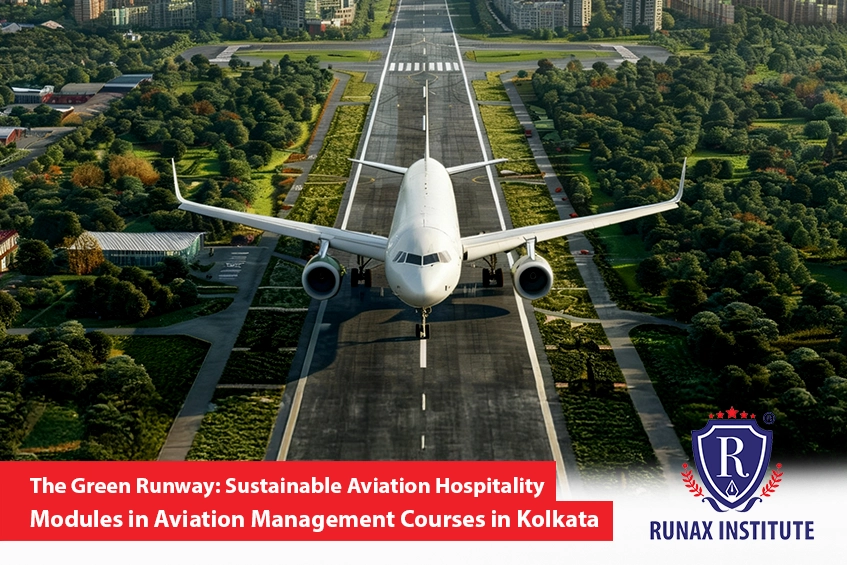Introduction
The aviation industry has always been about speed, precision, and luxury—but now, it’s about sustainability too. The world is demanding cleaner skies and greener airports, and hospitality is right in the middle of this transformation. From eco-friendly airline guest services to green airport operations in India, aviation is no longer just about taking off; it’s about taking responsibility.
In India, the aviation boom is real—new airports, more passengers, and a growing need for professionals who understand that a smooth flight experience must also be an environmentally responsible one. This is where Aviation management institutes in Kolkata are stepping up. Their modern approach combines sustainable aviation hospitality with world-class management training, preparing students to lead the green revolution in aviation.
This blog explores how an Aviation management course in Kolkata is shaping tomorrow’s sustainability-savvy professionals. These students are learning how to manage airport lounges, onboard services, and flight operations while keeping carbon emissions low and comfort levels high. Welcome aboard the green runway of aviation hospitality—where service meets sustainability and responsibility flies first class.
Why Sustainable Hospitality Matters in Aviation Systems
Air travel is glamorous, but behind the scenes lies a mountain of plastic cutlery, wasted meals, and high carbon footprints. The shift towards sustainable aviation hospitality isn’t just a trend—it’s a necessity. As global aviation expands, every flight adds to the environmental load.
That’s why today’s aviation professionals must master ethical hospitality in airline operations, ensuring each service contributes to a cleaner planet.
In India, the challenge is twofold: delivering premium hospitality while staying true to sustainability goals. Reducing single-use plastics, sourcing eco-certified catering, and managing cabin waste are no longer optional—they’re the new normal. The focus now lies in designing hospitality systems that balance comfort and conscience.
Kolkata’s institutes are training students to take this balance seriously. Through practical and theoretical exposure, they understand how carbon-neutral airline operations integrate with guest experience strategies. The goal is simple yet ambitious—to redefine aviation luxury so that “eco” and “elegant” coexist effortlessly. The hospitality of tomorrow will be judged not only by how guests feel but by how the planet heals.
Curriculum Evolution in Kolkata’s Aviation Management Courses
The aviation management course in Kolkata has gone through a major revamp in recent years. No longer just about ticketing, logistics, or service etiquette, today’s syllabus dives deep into green aviation curriculum concepts like sustainable supply chains, waste minimisation, and responsible catering.
Students now study modules on sustainable aviation management training where they learn how to design low-waste in-flight menus, manage green airport lounge guest services, and align hospitality strategies with environmental standards. The integration of sustainability-focused topics into core hospitality modules helps bridge the gap between theory and the planet’s real needs.
These modules also highlight international best practices, preparing students to manage hospitality operations at airports aspiring for eco-certifications. Classroom learning is supplemented by field projects and case studies on aviation hospitality waste reduction practices, helping students understand the tangible impact of sustainability decisions.
This curriculum shift in Kolkata proves that aviation education is not just about flying higher—it’s about flying cleaner. Students walk out of these programs ready to meet the industry’s future demands with knowledge that blends luxury service with sustainability ethics.
Green Guest Experience: Training for Eco-Conscious Passengers
Passengers today are more eco-aware than ever. They notice everything—from the recycled napkin in their meal tray to the compostable coffee cup in the lounge. So, aviation professionals must know how to design a sustainable passenger experience in aviation without compromising comfort.
Students at aviation management institutes in Kolkata are being trained to meet this new expectation. They learn how to create green guest experiences that combine convenience, luxury, and sustainability. That could mean using locally sourced, organic meals onboard, integrating carbon-offset options into booking systems, or creating educational touchpoints where passengers can understand how their flight contributes to sustainable aviation growth.
These practices are about turning passengers into partners in sustainability. Eco-conscious passengers feel valued when an airline goes beyond service—it shares responsibility. Through simulated modules and real-world projects, students master how to deliver that balance, building experiences that are indulgent yet ethical.
Tomorrow’s flyers want to travel guilt-free, and aviation hospitality education in Kolkata ensures students know how to deliver just that—premium, planet-friendly passenger experiences that leave smiles, not footprints.
Sustainable Airport Lounge & In-Flight Hospitality Practices
Sustainability in aviation hospitality goes far beyond serving organic salads in-flight. It extends into every corner of the passenger experience—right from the airport lounge to the aircraft cabin. Kolkata’s aviation courses make sure students understand how every operational decision affects environmental outcomes.
Hands-on training teaches them how to conceive eco-friendly airline guest services, implement aviation hospitality waste reduction practices, and maintain energy-efficient green airport lounges and guest service areas. From LED lighting systems and motion-sensor cooling to reusable cutlery and zero-waste food stations, the new hospitality standard is “planet-first.”
Students also study case models on how leading global airports use renewable energy and smart waste segregation systems. These insights give them a strong operational perspective, allowing them to manage sustainability goals in harmony with service excellence.
Kolkata’s aviation education prepares students to take charge of the hospitality experience while aligning with India’s commitment to greener skies. The result? A generation of aviation professionals who can transform airports into welcoming, waste-free sanctuaries of comfort.
Fuel, Waste & Energy: The Technical Side of Green Aviation Hospitality
Behind the smiling crew and spotless cabins lies a technical backbone that keeps aviation hospitality sustainable. Students in Kolkata’s aviation management course learn how energy systems, fuel policies, and waste control intersect with passenger comfort.
They’re introduced to the latest aviation fuel sustainability strategies, understanding how sustainable aviation fuel (SAF) impacts overall service logistics. From planning flight routes that reduce emissions to optimising in-flight service processes for lower power usage, these future managers gain a holistic view of eco-friendly operations.
Another critical aspect is waste management—students study how to design onboard sorting systems, compost leftover food, and coordinate with airport recycling programs. Modules also include training in green airport operations in India, showing how technical innovation supports hospitality goals.
This technical understanding helps future managers bridge the gap between engineering and empathy. They don’t just serve passengers; they manage the systems that make sustainable hospitality possible. That’s the level of awareness the aviation world needs today—sharp, green-minded, and technically grounded.
Industry Partnerships and Hands-On Eco Modules
Theory is essential, but practice makes sustainability real. That’s why aviation management institutes in Kolkata emphasise partnerships with airports, airlines, and hospitality providers that already follow green practices. These collaborations give students direct exposure to sustainability in action.
Through sustainable aviation management training, students take part in live projects like auditing lounge waste, analysing energy efficiency, and implementing green airport operations initiatives. They might shadow managers at carbon-neutral airline operations or assist in curating zero-waste catering programs.
Internships also play a big role. Students work on sustainability reports, hospitality process redesigns, and eco-certification assessments for aviation facilities. These opportunities turn textbook learning into tangible skills that employers actively seek.
By engaging directly with real-world sustainability projects, students learn how to manage hospitality systems responsibly. Kolkata’s aviation management programs ensure graduates are not just employable—they’re irreplaceable in the industry’s shift towards greener skies.
Challenges & Opportunities in Sustainable Aviation Hospitality in India
Implementing sustainability isn’t always smooth sailing. India’s aviation sector faces cost barriers, inconsistent eco-regulations, and limited access to sustainable materials. For example, developing aviation hospitality waste reduction practices or switching to biodegradable service ware often costs more upfront.
However, the opportunities far outweigh the challenges. The rising preference for sustainable passenger experience in aviation and the government’s focus on green aviation make this the perfect time to innovate. Airlines that embrace sustainability gain brand loyalty, reduce long-term costs, and attract eco-conscious travellers.
Students trained in aviation hospitality and environmental stewardship understand these realities. They’re prepared to manage both the optimism and obstacles that come with change. By studying practical case studies, they learn how to adapt strategies, maintain profitability, and still deliver eco-friendly hospitality.
Kolkata’s institutes equip future aviation leaders with the mindset to see sustainability not as a burden but as a business advantage. The sky’s the limit for those who know how to serve passengers and protect the planet at the same time.
Career Prospects: Green Hospitality Roles in Aviation
The future of aviation hospitality is painted in green hues. With airlines, airports, and governments embracing sustainability, new career roles are emerging fast. Graduates of aviation management courses in Kolkata are perfectly positioned to lead this shift.
Students can pursue roles such as Sustainability Coordinator (Airline Hospitality), Green Hospitality Analyst (Airport Service), or Guest Experience Manager (Eco-Lounge). These positions require both traditional service excellence and deep knowledge of sustainability standards.
Professionals trained in aviation hospitality education can manage everything—from energy audits in airport lounges to designing eco-friendly airline guest services that meet carbon-reduction goals. This dual skill set makes them valuable assets for global aviation brands aiming for greener certifications.
In short, the demand for professionals who understand both hospitality and sustainability is skyrocketing. Kolkata’s graduates aren’t just getting jobs—they’re shaping the future of eco-luxury in aviation.
Final Notes
Kolkata is fast becoming a knowledge hub for sustainable aviation training. The city’s aviation management institutes are nurturing students who understand that hospitality in the sky isn’t just about smiles—it’s about sustainability.
These institutes are not producing traditional managers; they’re creating aviation hospitality and environmental stewardship leaders who know how to align luxury with responsibility. By integrating eco-modules, live sustainability projects, and exposure to green airport operations in India, Kolkata is setting new standards for aviation education.
The aviation management course in Kolkata represents India’s step toward greener skies, smarter airports, and sustainable guest experiences. Tomorrow’s aviation professionals will need to know how to make passengers comfortable without making the planet uncomfortable. Kolkata’s institutes are making sure they’re ready.
The green runway has already been built—it’s time for future aviation hospitality leaders to take off responsibly.
Frequently Asked Questions
1. What is the focus of aviation management courses in Kolkata today?
They focus on combining hospitality excellence with sustainability principles. Students learn about green airport operations, eco-friendly service design, and sustainable aviation management training to prepare for the modern industry.
2. How are aviation students trained in sustainable hospitality?
Students undergo practical training in aviation hospitality waste reduction practices, energy efficiency, and green supply chains through internships and live eco-projects.
3. Why is sustainability important in aviation hospitality?
Because luxury can’t come at the cost of the environment. Sustainable hospitality ensures airlines reduce waste, carbon emissions, and energy use while keeping passengers satisfied.
4. What kind of jobs can graduates get after completing these courses?
Graduates can work as Sustainability Coordinators, Eco-Lounge Managers, or Green Hospitality Consultants in airlines, airports, and hospitality chains.
5. How does India support sustainable aviation initiatives?
India supports sustainability through SAF (Sustainable Aviation Fuel) policies, green airport certifications, and national carbon-reduction targets that guide aviation management education.






